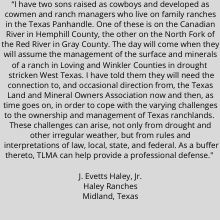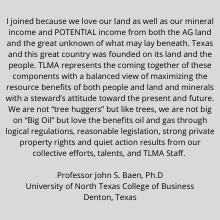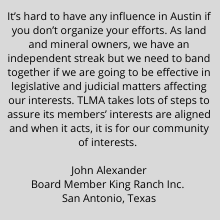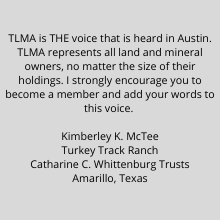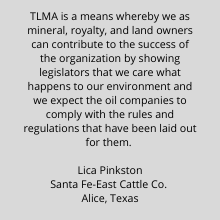BILLS PASSED
- HB 2259 – Financial Security for Oil and Gas Operators. Increased bonding requirements and clean up responsibilities for operators. This is small improvement in current law. TLMA sought even tougher standards but the legislature sided with industry. – Signed by the Governor.
- HB 2685 – Landowner Bill of Rights. Requires an entity with eminent domain authority to provide landowners with a copy of the Landowner’s Bill of Rights before beginning condemnation proceedings. Signed by the Governor.
- HJR 14 – Creates a constitutional amendment to limit eminent domain powers for economic development. Election to be held November 3, 2009.
BILLS DEFENDED
- HB 834 – Severance of Mineral Interests. Would have created a structure where mineral interests can be severed from the land for non-use. Failed to Pass.
- Successfully ensured that efforts to require forced pooling did not get filed.
NEGOTIATED/OPINION SOUGHT/TESTIMONY GIVEN
- HB 4246 – Lost and Unaccounted for Gas. Would have set limits on how much line loss a pipeline can claim. Failed to pass.
BILLS OF INTEREST
- HB 1231/HJR 62 – Would have reduced number of Railroad Commissioners from three to one. Failed to Pass.
- HB 1405 – Would have required licensure and regulation of Texas Petroleum Landmen. Failed to Pass.
- SB 341/HB 499 – Would have changed name of Railroad Commission to Texas Energy Commission. Failed to Pass.
80th Legislature - 2007
BILLS PASSED
- HB 630 - Notice Bill—Requires an oil and gas operator to provide notice to landowner upon receiving permit to drill. – Signed by the Governor.
- SB 3 – Water bill. Among other things, this bill incorporated a version of SB 714 which requires oil and gas operators to register their well with the local groundwater district. Signed by the Governor.
- Saltwater Evaporation Pit Regulations Strengthened.
NEGOTIATED/OPINION SOUGHT/TESTIMONY GIVEN
- SB 1574 -Surface Use Act. Would have required oil and gas operator to remove equipment when well becomes unproductive and put other operating standards in place. Failed to pass, however, made it much further in the process than any previous session. Lots of momentum behind this bill for the next session.
- HB 2007 – Eminent Domain. Bill would have significantly improved landowner rights in condemnation proceedings. Passed the Legislature, vetoed by the Governor.
- HB 521 (SB 715) - Would require notice to purchasers and adjacent property owners of any impending disposal well applications. Failed to pass.
- HB 1904 - Increased bonding requirements and created new tiers for payment based on the number of oil and gas wells owned. Failed to pass. Interim study forthcoming.
- HB 1920 - Originally prohibited a person who transports or gathers gas from losing more than 5% during any one month. Such a loss would be considered waste. This bill was negotiated to a point where the specific amount of lost and unaccounted for gas, not considered. Failed to pass.
79th Legislative Session – 2005
BILLS PASSED/SUPPORTED
- SB 1130 – Pipeline contamination reporting bill. Bill requires pipeline companies to report any contamination discovered during any repair, expansion, or maintenance work over existing easements.
- SB 575 & HB 753 – Notice to Landowner. Would have required oil and gas operators to provide notice to landowners of intent to drill. Failed to pass, however it was approved and signed by the Governor the following session.
- Supported the Texas Constitutional Amendment that would limit the use of eminent domain to take private property for private parties or economic development purposes.
BILLS DEFENDED
- HB 2160 – “Check Off” bill. Would have taken a percentage of royalty payments to create an Energy Education Council made up of industry executives to promote the oil and gas industry in Texas. Failed to pass.
- HB 2881 – Primary Jurisdiction. Bill would have required a landowner to go through the Railroad Commission instead of using the court system to require an operator to remediate oil and gas pollution of groundwater. Failed to pass.
- Protected efforts to decrease bonding requirements.
78th Legislative Session – 2003
BILLS DEFENDED
- Oil-industry sponsored forced-unitization bill that would have allowed oil companies to enter onto your land or your mineral interest to drill wells, even if you refuse to sign an oil lease. Failed to pass.
- Oil Industry sponsored “Check Off” bill that would take a percentage from every royalty owners check and to go to fund oil company lobbyists in Austin. Failed to pass.
- Oil Industry sponsored Bill to allow oil salvage companies to abandon old wells on your land without plugging them to protect your water wells. This bill was very popular at the time and extremely difficult to defend against. Failed to pass.
77th Legislation Session – 2001 – TLMA's First Session
ISSUES ADDRESSED
- Royalty Payment Information-Disclosure
- Oil Field Cleanup-Illegally Abandoned (Orphaned) Wells
- Mandatory Venue
- Reinstatement of the Discovery Rule
BILLS PASSED
HB 981 - This check-stub bill greatly increased the amount of information contained on royalty check stubs. In particular the bill required the following:
ON CHECK STUB
–County and state in which the lease, property or well is located
–Telephone number of oil company
UPON REQUEST
–Heating value (Btu)
–Annual report to include
- each lease, property or well identification number
- each lease, property or well name
- the field name
- the county and state in which the property is located
Your oil company must give you written notice once a year that you have a right to this information. If an oil company does not provide the information, you may bring a civil action against the oil company and if you prevail, you are entitled to court costs and attorney fees
SB 310 – Railroad Commission Sunset Bill
- TLMA was successful in merging several key issues related to the abandoned well problem into the RRC Sunset bill:
–Increased annual funding to Oilfield Cleanup Fund from $12 million annually to $20 million annually
–Required mandatory bonding of every oil and gas operator in Texas - completed September 2004
–Immediately stopped the transfer of all wells to unbonded oil operators
–Increased RRC discretion for “good guy” exception to bonding requirements

